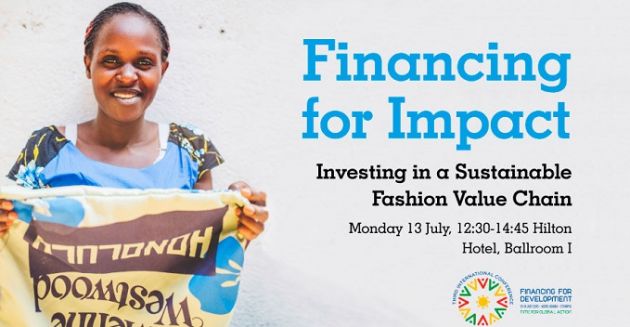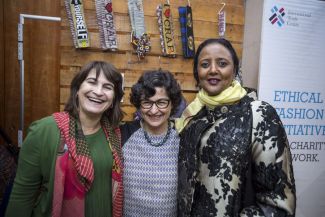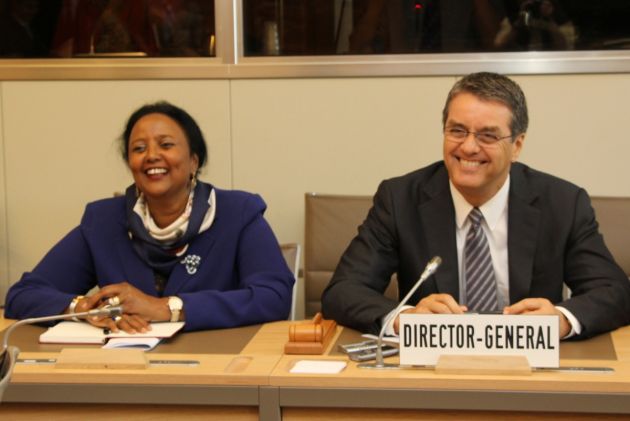African fashion seen spinning thread in world poverty fight by global trade facilitator

Arancha González started this week using a fashion event at an Addis Ababa international development conference to promote small and medium businesses to stimulate trade which she sees a key lever to remove global poverty.
The Third International Conference on Financing for Development from July 13-16 has pulled in heads of State, finance, foreign affairs, development ministers, institutional stakeholders, non-governmental organizations and business sector entities.
As the Executive Director of the International Trade Centre (ITC), González is a crucial global player in channelling development expertise and funding that stimulates global trade.
She is an experienced trade negotiator who has worked at the highest level in the World Trade Organization (WTO) and has a passion about poverty reduction through trade.
The Geneva-based ITC is, "is a joint agency of the World Trade Organization and the United Nations. It has a double affiliation, so it is pretty unique in the world," she said in an interview.
The July 13 event shone the spotlight on fashion as a vehicle for lifting people out of poverty through sustainable trade, an area of small and medium business in which South Africa has recently been showing great potential.
"We are a development partner for small business export success and ITC's goal is to help developing countries and those in transition countries achieve sustainable development through exports," says González.
She notes that women form a majority of the world's poor and that in fragile states and post-conflict societies, the percentage of women living in poverty is even higher, but that they play a key role in burgeoning SMEs.
AFRICAN DEVELOPMENT BANK
The Addis Ababa fashion event was hosted by the ITC, the African Development Bank (AfDB) and Germany during the International Conference on Financing for Development.
The AfDB was represented by Geraldine Fraser-Moleketi who held different South Africa cabinet portfolios until 2008. She is now Special Envoy on Gender for AfDB and took the stage with Africans leaders including the foreign and trade ministers from Kenya.
González was part of the recent aid for trade conference hosted by the WTO noting that its focus was on making trade happen.
She said that the WTO makes trade possible. It opens trade opportunities by reducing trade barriers through trade agreements that are important in creating chances for countries to get over those hurdles and take part.

"The ITC is about helping translate trade opportunities into trade realities. It is building a bridge for trade," explained González.
"Our job is to translate trade opportunities created by WTO into poverty reduction and development which is the mandate of the United Nations, so we are a builder of a bridge using trade as development.
"We are a development agency that promotes the economic development of small and medium-sized enterprises in the South."
Sometimes the ITC will be helping small and medium companies set up strategy plans, aiding them with market intelligence, helping to improve quality of products, branding and marketing and supporting companies get access to credit.
It's about translating trade opportunities into trade realities and a big area of its mandate is in sub-Saharan Africa and post-conflict economies with donors that are mainly governments, but also companies and it likes to work with the private sector.
"The ITC is an inter-governmental organisation and it is an inter-governmental development agency. We don't do rules; we don't negotiate treaties."
The ITC helps textile producers and women, and it always starts from the market, looking not at what people can do, but who wants what they can do.
AFRICAN FASHION DESIGN
In the fashion industry, says González, "We are helping bringing up young African talent. So, we not only want to have the big fashion houses give their designs to women to produce.

"We want to grow local African designs, and designers to be the engine for the fashion industry in Africa."
In the last few years the ITC has run a competition across Africa and taken its top fashion designers to Milan and other centres to give them opportunities.
"You can see you fashion designers are taking off in Africa.
"We want to use the market and use the force of trade to generate trade as a long term sustainable response to reducing poverty," says the ITC head, noting that countries like Ethiopia, South Africa, Nigeria, Kenya and Angola can play a vital, national, regional and continental roles.
At the same gathering in Addis Ababa, the Director-General of the WTO Roberto Azevêdo said trade played a major role in the successful global effort to halve extreme poverty by stimulating businesses which also help to grow tax coffers used in development.
"And it can do a great deal more in the years to come. A range of policy measures are needed to make sure that the poor feel the full benefits of trade.
"We have identified trade finance as a key issue here. Up to 80 per cent of global trade is supported by some sort of financing or credit insurance. But developing countries are still suffering from the consequences of the 2008 crisis.
"The supply of credit has not yet returned to normal levels. And so we are seeing big financing gaps, particularly in Africa and Asia," said the WTO chief.
"The estimate for the value of unmet demand for trade finance in Africa is between $110 and $120 billion. By bridging this gap we would unlock the trading potential of many thousands of individuals and small businesses across the continent. The smaller the business, the bigger the gains."
But one concern that must not be forgotten in development is taxation, which is a "moral issue" Rev. Suzanne Matale, general secretary of the Council of Churches in Zambia, said at the meeting in Ethiopia.
"Tax is a predictable source of domestic finance that serves as a bridge between haves and have nots, and it must be used to better people's lives," said Matale.
The Zambian church leader represents the World Council of Churches at the Independent Commission for the Reform of International Corporate Taxation.
She called on African governments to more effectively tax and regulate multinational extractive industries that are plundering the region's resources. "We cannot depend on foreign aid," Matale noted.
But the engine to get trade going and taxes flowing is closing Africa's infrastructure gap, a top priority in order to put the continent on a path for double digit growth and sustainable development, says economics professor, Jeffrey Sachs.
"There is no choice, Africa needs 10 per cent per year of economic growth in the next 15 years," said Columbia University professor Sachs noting a need to focus on large-scale investments in trans-national infrastructure projects in power, roads, broadband, and other core regional infrastructure needs.
Sachs spoke at an event in Addis Ababa, themed "Unlocking Public and Private Capital for African Infrastructure," organized by the New Partnership for Africa's Development Agency and Sustainable Development Solutions Network.

